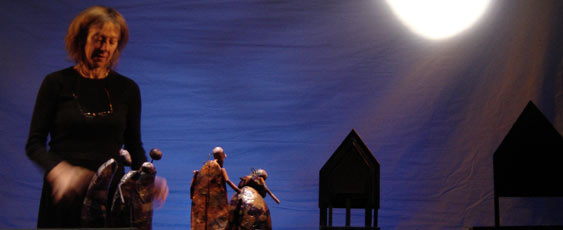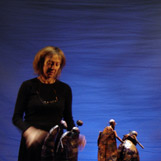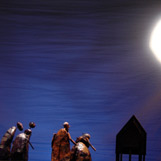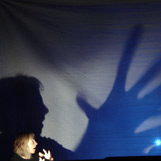
Practitioner Voices: Mandy Travis
Interviewed July 2004 by Becca Gill as part of the Total Theatre Explores research project.
Mandy Travis' performing career started in fringe theatre
with companies such as Footsbarn, Cunning Stunts, Covent Garden Community Theatre and Incubus.
She then worked in regional repertory theatre, and London West End appearances include The Secret Diary of Adrian Mole and Les Miserables.
She has played a wide variety of roles in TV sitcom, serious drama, and soaps such as The Bill, Brookside and EastEnders.
Through taking her son Joe to see puppet theatre, Mandy became interested in this artform and after developing her puppetry skills through
a range of workshops, she joined the Little Angel Theatre in 1997 as a performer/puppeteer in productions such as The Elves and the Shoemaker,
The Peach Child and Beauty and the Beast.
More recently, working with the theatre's artistic director Steve Tiplady, she has performed and puppeteered in Jabberwocky, Stuff and Nonsense,
Pipsqueak and The
Mouse Queen. Television puppetry includes the character of Oink the pink pig in GMTV's Macdonald's Farm.
In addition to her performance and puppetry skills, Mandy also sings, plays the saxophone, penny whistles and is pretty nifty on the spoons.
She recently received a grant from Arts Council to work on her own show, The Lost Moon.
How do you describe your artform practice?
I describe myself as a performer/puppeteer.
Before 1997 I suppose I would have described myself as an actress/performer; I wasn't yet involved in puppetry. Now I only do shows that involve puppetry - I've become hooked on puppetry. So I work in puppetry and physical and visual performance. With live music if possible.
I also play sax, spoons and sing, and many of the shows I get involved in include using my musical skills as well.
How do you describe your work?
I am a puppeteer/performer - I guess I would define myself as an interpreter of other people's ideas. Once the idea is there, I inject it with my own peculiar colour and characterisation and develop it through performance.
I am absolutely no good at directing or making. I can write a bit, but it is important and necessary to me to have other people around to work collaboratively as a team on a production. I'm applying for a research and development grant to make my own one woman show. I have asked Steve Tiplady to direct, Hannah Marshall to compose and play live and Peter O'Rourke to design and make the puppets, because I can do none of those things and because I love their work. Happily, they have all agreed!
It is only recently at the age of fifty-one that I have come to terms with the fact that I have not failed if there are certain things I can't do or am not good at. I am now looking at and developing the things I am good at. I love what happens when practitioners from different theatre skills and disciplines come together to make a piece of theatre; I love the collaborative process - the play involved in the process and the fear of not quite knowing what the end product will be - although that scares the shit out of me!
Throughout your career, with companies such as Footsbarn and Cunning Stunts, has that been the way that you have worked?
Yes, very much so, but that was twenty-five or thirty years ago and I was very young and inexperienced and really didn't have any other knowledge apart from performing. I just went along with what was going on as far as I can remember. And at the end of it, there'd be a show. I didn't think 'Oh this is a collaborative process'. I didn't analyse anything - I was far more daring and far less self-conscious and less analytical than I am now, and a lot of the time I think I probably just did as I was told by more experienced members of the company. I didn't have any knowledge of direction, design, costume or lighting, but that didn't seem to matter then.
It's only really recently, since working in puppetry that I will dare to put in ideas on things other than actual performance, because now I am learning about these things myself through the collaborative process and have more of an idea of 'total theatre' now than I ever did with Footsbarn, Cunning Stunts and Incubus. Later, when I went into the Rep, West End and Telly, it was a completely different ball game; then you really are just a pawn in some director's or writer's game - not allowed or expected to have any ideas about the production as a whole. Consequently, you become totally obsessed with your own personal performance rather than concerned about the production as a whole. I could never go back to working like that. Although I don't know if it is still like that - it is a long time since I was there.
What are your main areas of inspiration and do they change with each project?
Music, I am very much inspired by music. I think it is very necessary to the performances I am involved in, and if it can be live, then even better. That, and the relationship between puppet and puppeteer.
When I watch a show, I love to be able to see the puppeteers and I love to be able to see the musicians. If the focus and lighting and intention are right, this enhances the show rather than being a distraction.
It is strange when some adults come to see the shows I am involved in and say what a shame our faces weren't covered - or wouldn't it be better if the puppeteers were hidden. Luckily it happens less and less - I think we are slowly re-educating them!
Children don't seem to have that problem. I am also inspired by the idea of presenting a story to the audience in a way that leaves something to their imagination - I like strong, unusual imagery and puppets that are not too obviously figurative. I like to try to tell a story in a way they will not have not seen or heard before. That is why the direction, design and music are so important - they complement the performance and vice-versa and this was particularly true in the last two projects I worked on - the Little Angel's Jabberwocky and Mouse Queen.
Does gender matter in performance?
Not in the slightest. When I lived in Cornwall in the 70s doing loads of street theatre and working with Footsbarn, I never gave gender a second thought. Then I came up to London and I joined Cunning Stunts and there was talk of us performing just for women and I couldn't really see the point. I was a bit confused as to the reason for this. For me, that would be like preaching to the converted. If you perform in front of a group of women, what you are saying is: we don't want to perform this to men... I don't know. But if you do a performance to a mixed audience, that seems to say to me, here we are, showing you a strong piece of theatre, and, hey, we don't need to have men involved to be able to do it. Then you are saying something. Because men will see that and perhaps learn something. An all-women audience would probably already know that, so what's the point?
I'm not extreme in any way. I think of myself as a feminist, I'm just not extreme about it. I'm all for equal rights, and the right to choose. I don't like exclusion and a lot of extreme feminism is not about inclusion, it's about exclusion. That is just my personal opinion.
Does your body determine the work you make or the way in which you make it?
Yes, and as I have already mentioned, I'm now getting on a bit and I have found that I have less and less mobility in my joints. I used to be incredibly flexible. I still have the same amount of energy, it's all still there, but physically I'm not always up to it. I now have to watch what I do, but that is more to do with my age not specifically my sex. When I did Trafford Tansy, I was thirty-one and I had to learn how to wrestle professionally, to do somersaults and throw people - it was fantastic and I have always loved a challenge. And I still love physical work, but now I have to wear kneepads when I am crawling around with the puppets, and supports on my elbows when operating heavy puppets.
I've now got to look carefully at what I'm doing and build my inner strength up beforehand. I think you can still be exciting visually - you don't have to be throwing somersaults all the time, you can be exciting through stillness, timing your movements, and through cultivating a strong stage presence.
Would you consider your artistic priorities to be different to those of men?
I wouldn't have thought so, but then I don't know specifically what men's artistic priorities are. Certainly my own priorities changed when I had my son and he is fifteen now.
I've been offered the opportunity to go off and tour with companies or do jobs away from home, and I haven't always been able to, though before Joe went to school, I used to take him with me on Rep jobs and find childminders and babysitters when I got there. It has always been my own choice to say no to an awful lot of opportunities in order to be with my child. I have absolutely no regrets about that.
I have thoroughly enjoyed bringing him up. Having a child taught me how to play and it was through him I discovered puppetry. I feel almost younger now than I did twenty years ago. The longer I have gone on the more I have realised there is to learn.
In four years he will be out of school and hopefully I will still be working in theatre and will be able to move around more if necessary.
How would you define feminism?
I don't define. I'm not a very political animal; I don't get actively involved in political or feminist issues. I look at the people I'm working with and they are people I like working with - we all treat each other equally and respect each other as individuals rather than as men or women. When people start to create boxes I withdraw, I don't take sides. I feel pretty equal and I have made choices that I am happy with. As long as women have the choices and are treated and respected by men as equals then that is all that matters. I feel that I am lucky enough to have that, and that I am not treated differently because I am female.
The trouble pre-feminism, I suppose, was that women didn't have the choices, or equality with men and some women still don't in other countries and in other cultures. For that reason, feminism needs to be fought for and if there are people who want to do that, then that is absolutely fantastic.
I suppose I'm a selfish animal, I have my freedom and I have my choice, but I recognise the need to continue that fight for women who do not yet have those rights.
Do you think that theatre can effect social change?
Yes. You have to get people to go and see it though, which is the trouble. Physical/visual theatre performances usually attract audiences of those who work in physical/visual theatre and those who already know about it - preaching to the converted in a sense. What we have to do is make our art more accessible to the masses, the way I think it is in Europe. I think theatre here is still a bit elite and you can't do much about social change if the right people aren't seeing the stuff.
Outside London, few people have heard of the London International Mime Festival or the London International Theatre Festival (at least, people I've met in Winchester who don't work in theatre haven't - and they are always completely bowled over when I take them to see anything of this sort!), so we need to make it available in smaller towns and other areas.
But I think slowly we are pushing through into other areas, and audiences are becoming more adventurous. There are companies taking their shows into schools and I think particularly with children if you show them good stuff, I think the message will get through.
So yes, I think theatre can effect social change.
How would you define the effect of the funding system on women's performance work?
I don't know very much about the funding system, in fact until about a month ago I knew nothing; the only reason I'm finding out now is because I said to Steve Tiplady that I wanted to do a one-woman show at The Little Angel - would he direct me? And he said yes, but I'd have to apply for a grant. I'm now writing my application - I don't have any opinions on it yet because I don't know if the project is going to be funded yet!
What from your perspective is the future for women within performance?
I hope the future is good. Hopefully funding will continue for artists to have time for research and development, and if this happens, other women, like myself, will be given, through funding, the encouragement and confidence they need in order to explore their potential and ultimately to produce cutting edge theatre.
A footnote to the above interview from Mandy Travis...
Voices:





